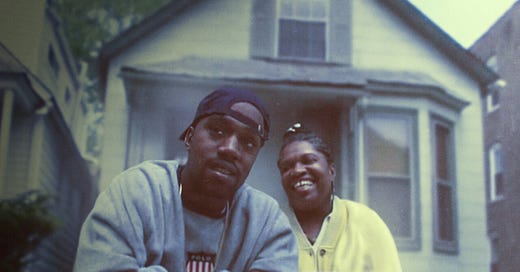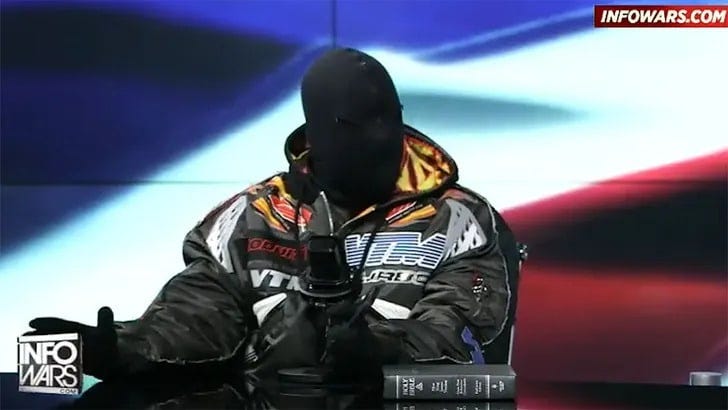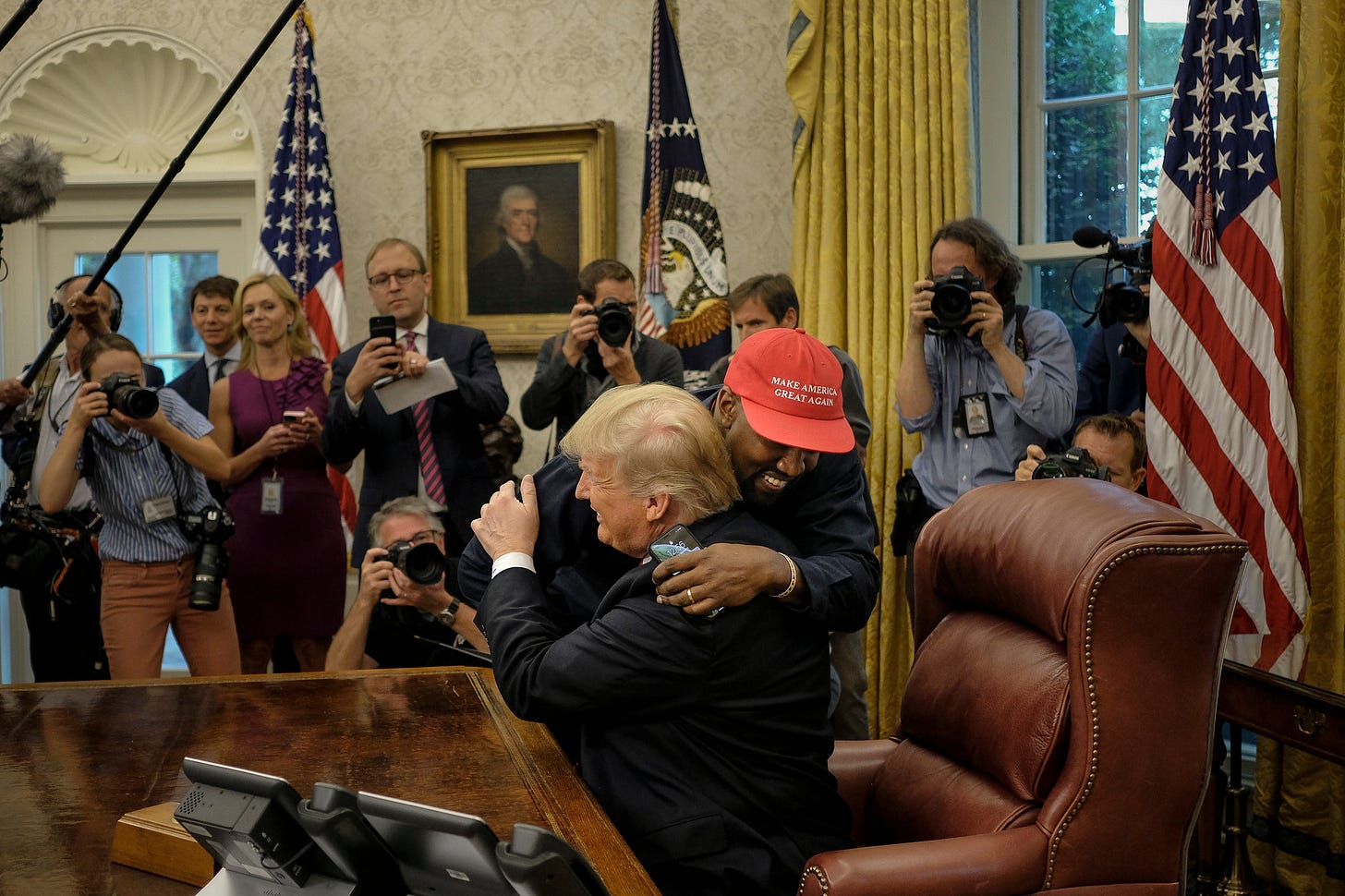The Long Take: I'm Sorry Kanye
How the world's biggest rapper became the world's most unreliable narrator.
Imagine a scenario in which Alex Jones, America’s biggest conspiracy theorist, was made uncomfortable as a public figure right next to him, just said the most irrational opinion that went over the line because it broke a taboo you cannot do in polite company. This man happens to be someone who shaped a large part of this century’s popular culture and his politics indicates that he is friendly with a former President of the United States. He’s also in the midst of a future bid to become the President and the person managing him is notorious for denying the Holocaust, while maintaining a plausible deniability that will make his followers claim that these views were taken too seriously by his critics. This is while his mind is in a rapid decline and there’s little to be done at this point unless he can still be reliable. That person is no longer larger than life and has finally become the world’s most unreliable narrator.
To say that Kanye ‘Ye’ West’s downfall is parallel to a Shakespearean tragedy is an understatement. His antisemitic remarks closed the books to an otherwise accomplished career and it will take a miracle to revive it. As he is no longer a billionaire, thanks to losing a deal with Adidas that once sold his brand of sneakers, Kanye has even alienated those who initially appreciated his political heterodoxy, usually linked to American conservatism. He feuded with Ben Shapiro, who criticized his recent meeting with Donald Trump. That meeting was accompanied by Nick Fuentes, a white nationalist, and Milo Yiannopoulos - who disgraced himself in 2017 and has since declared himself to be an ex-gay Christian - who briefly managed his campaign. His Twitter account was suspended again, weeks after Elon Musk reinstated it because the owner of the platform has now said that he was ‘inciting real-life violence.’ The series of interviews, beginning with Tucker Carlson and continuing up to Alex Jones, did not help the fact that he was in the midst of a manic phase, induced by his bipolar disorder. Even with the mildest pushback and larger empathy from these interviewers, we understood him less than we did in the past.
One has to wonder why he wants to be around these individuals, with his legacy as the greatest rapper in the game continuing to be on the edge. Within this story is a set of characters known for going against the manners of the consensus. Tucker Carlson is a cable news presenter and journalist very critical of the political establishment, going so far as to whitewash the January 6 riots. While Shapiro is a conservative living up to certain principles, and Musk remade Twitter in an attempt to make it more politically neutral, Fuentes and Yiannopoulos are ideological demagogues whose relevance only comes to the proximity of someone more prominent and are motivated to disrupt the Republican Party. Each of these felt that Kanye has been useful in pushing a certain narrative. It is obvious that while his views overlap with Fuentes, they meet eye to eye with their tongue-in-cheek yet dogmatic approach to politics, with some of their followers going to pains in deluding as inaccurate or more sensible than how it was expressed. Both Carlson and Shapiro previously praised Kanye for being sane, enabling him when he’s at his very worst.
Kanye ‘Ye’ West has always been a contrarian who finds an existing boundary to break and it does not begin with his music or his politics. His wide-reaching creativity meant that each of his albums remains influential, defining a particular era of hip-hop and inspiring a new set of rappers. 808s and Heartbreak, an album entirely relying on Autotune and melodic singing rather than rapping made Drake the world’s biggest rapper. He also happens to be Jewish, a rarity in hip-hop, considering the level of antisemitism embraced by some rappers. Jeen-Yuhs, a Netflix documentary directed by Coodie Simmons, entails his meticulous creative abilities and passions that many would associate with Kanye. From the beginning, he was more interested in becoming a rapper and does not want to be sidelined as a producer that is only reliable in making great beats. He attempted to break his debut The College Dropout to Roc-A-Fella records several times. But some of them weren’t interested in the conscious rap and the chipmunk-like production that surrounded the album.
The erraticism remains a significant part of his personality and it is frequently entangled with his musical vision. Yet often it could lead to greatness. In 2009, Kanye interrupted Taylor Swift during the VMAs, as she won Best Female Video over Beyonce. I was in high school when that happened, and most kids really disliked him because of that. Personally, I appreciated this opinion, even if he conducted it in a crass manner. What it lacked in foresight, it did have a grain of truth. That the music video of Single Ladies - which features Beyonce performing with two backup dancers in black and white - is more memorable than Swift’s You Belong With Me, which was a cliche story of the unpopular high school girl falling in love with the popular football player. Kanye’s reputation took a blow for tearing up an underdog winning an award for the first time. Barack Obama called him a jack-ass. For some of his fans, it became clear that the artist, who once put out warm and cheery melodies in The College Dropout and Late Registration, is no longer there. But a year later, Kanye produced My Beautiful Dark Twisted Fantasy, which most critics would regard as the centrepiece of his career. Most would put up with his public antics, so long as the incredible quality of his music remains consistent.
The Life of Pablo is Kanye’s most revealing work, a pastiche of his older and newer sounds that frequently revolve around his scrambled thoughts. It was not finished when it was released in February 11th 2016, and the marketing rollout was chaotic. Each sound was being updated and Kanye called it “a living, breathing, changing creative expression.” During the album, he lampoons his critics asking them to “name one genius that ain’t crazy”, followed by a track that mocks those who are nostalgic about the rapper of the past. Kanye’s psychosis has always served as a spectacle, putting himself in the forefront. In the year when he released The Life of Pablo, he was hospitalized and diagnosed with bipolar, cancelling the tour promoting the album. Following Donald Trump’s election, he appeared side by side with him at Trump Towers.
Kanye’s political endeavour continued by praising Candace Owens and branding himself as a free-thinker who wants to bridge the ideological divide. It made him a liability to his friends and progressive followers. For many who have tolerated so much of his antics in the past, this was the last straw and a betrayal to the African American community. As someone who loves hip-hop and possesses a conservative outlook, it was surreal to see him officially professing his support of Donald Trump in 2018, as well as the ideas and figures associated with the former President. These were two colliding worlds that have little in common, except for the man who brought them together. Nevertheless, whether or not they were familiar with his music, conservatives and heretical thinkers embraced the new phase of his ideological journey. Coleman Hughes’s first essay was about West being the most famous avatar of black conservatism, which was then represented by the likes of Thomas Sowell, Clarence Thomas and Glenn Loury.
Defenders of Kanye would correctly point out the double standard that progressives have for racial minorities who are uncomfortable with their embrace of identity politics. There were certainly moments that went too far in criticizing Kanye’s visit to the White House, one of which involves Don Lemon bringing up his late mother Donda West in a panel on CNN. But one would assume that a free thinker would actually hold logic and reason as two important values. Kanye’s moment with Trump felt incoherent, leading on with numerous topics that are left vague to the media’s judgement. Despite the growing discomfort, the public interest in his music did not wane. While Ye did not match the heights of his previous works, it was at least an honest attempt at accepting that he has bipolar disorder. Kids See Ghosts, his collaborative album with Kid Cudi, was critically acclaimed, and his productivity did not stop there. Kanye released Jesus is King and Donda, two albums that are entirely themed on Christianity. The critical reception for both was lukewarm but was praised by some on the Right, because he rejected his excesses, like his addiction to pornography. One of them was Nick Fuentes, who once said that Jesus is King was a powerful experience.
Kanye’s stunt at the Paris Fashion Week by donning a White Lives Matter t-shirt and reuniting with Candace Owens, reveal more ominous things to come. He claimed that George Floyd died from fentanyl than by Derek Chauvin choking him. He pretended that JP Morgan removed his bank account because of his comments when in reality, he has planned to cut ties with them for weeks due to professional differences rather than a culture war about censorship. But someone has seen it coming. One of the final bits in Jeen-Yuhs, showed him watching Tucker Carlson talking about Kanye. Coodie Simmons, having directed his first music video Through The Wire, felt discomfort saying that he was being taken out of context by him. Kanye refused to hear any pushback at this point, and the limits of who would accept him would have no periphery.
Audience capture is a feedback loop that creators succumb to by telling a part of their base specifically on what they want to hear, and ultimately getting rewarded for it by validating them and eventually having them become the majority. While it has negative connotations, there is a lazy tendency to make it a blanket dismissal of both the creator and his followers because they hold a difference of opinion. But one would think that beyond the music, Kanye’s commentary and his participation in the culture wars would have useful insights to say. For that group, they face institutional backlash for their dissenting beliefs. Audience capture relies on the creator to be an authority figure; it’s easy for a doctor with reservations about handling a pandemic, for example, to get more attention. A celebrity who shows flashes of bucking orthodoxy will attract anyone who is exhausted from hearing the opinions of an elite consensus. But the creator has to bring a good impression and engagement, and Kanye only blurred the lines between genius and unhinged.
Kanye’s public appearances no longer had any use, once he became more transparent with his antisemitism during his manic phase. It was never a good idea for Elon Musk to reinstate his Twitter account in the name of free speech when that person not just enabled age-old hate and harassment, but is reaching mental lows. A study has shown that for some benefits social media has on users, it has a delirious effect on an individual’s mental health, especially when there isn’t a notable safety net that would protect them. But it reveals that such heterodoxies would reach their dumbest conclusion when considerable pundits are willing to pretend that these artificialities made him honest. Candace Owens dismissed anyone who called him antisemitic, leading to tensions between her and The Daily Wire. Tucker Carlson called Kanye honest, despite omitting most, if not all, of the conspiracy theories that he uttered during their interview.
An unreliable narrator is a trope, denoting that a first-person character is contradicting himself when he tells a story. They can either be a liar, a madman, a picaro or naif. But the audience is also involved when they are uncritically receptive to their low credibility. Kanye resembles all of that with a new crowd that never cared about the virtues of his music, but a slither of a thought that complements their worldview. He saw right-wing politics as a marginalized set of ideas while America was deeply divided. But at the beginning of his career, he received praise from progressives for calling out George W Bush’s inept handling of the aftermath of Hurricane Katrina and some were claiming that Kanye was a victim of casual racism, whenever he experienced another controversy. But he was never useful since he does not fit into the serious and policy-oriented framework that politics would normally demand.
The question of why this author would now feel uneasy about Kanye as a public figure, after so many years of believing in him, and accepting his bold drive, will be hard to answer when the weaknesses were staring at us in the face. In his music, there has always been a glimpse of humanity underneath his neuroses. On Watch The Throne, Kanye once said that he would let his son vote Republican so that everyone knows he loves white people. Some critics interpret this as an indictment of race relations in America, but it is not the case now. A lot have missed the old Kanye, but that might have been the new Kanye as well.







